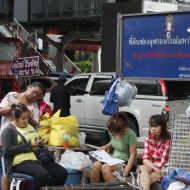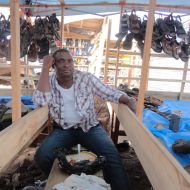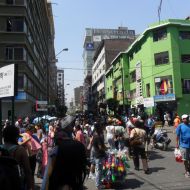Grab-and-Go Culture Makes Phone Cards Accra’s New Cash Crop
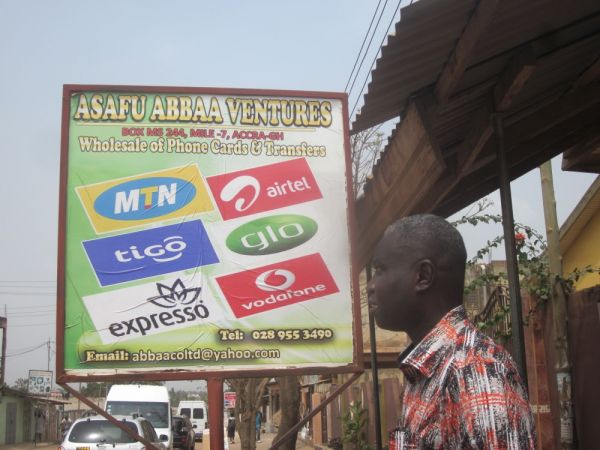
In a matter of years, the telco industry has exploded in Africa, with logos plastered everywhere. Photo credit: Sharon Benzoni
“It all started in a very small way,” says Edward Asafugye. A round-faced man with wire-rim glasses and a bluetooth receiver in his right ear, he leans back in his chair amid stacks of his stock, a money counter and sacks of coins. Five years ago, Edward explains, he saw an opportunity. Facing the failure of his transport business, he decided to research new industries. He was intrigued, he recalls, by the burgeoning telecommunications industry. Weeks later, he was selling mobile-phone recharge cards door-to-door in La Paz and Abeka, low-to-middle-income areas on Accra’s northwest fringes. He would wake before dawn and go to bed long after sunset, driven by his own long-term goals and the value of the relationships he was building. Two years later, he’d saved enough money to build the small shop in Lapaz where we are now sitting.
Edward’s shop is unassuming, a tiny cement-and-glass storefront on a street just off the newly built George W. Bush Motorway. In the waiting room, three chairs line the wall and a small flat-screen TV is bolted into the corner. Every day, dozens of customers come to his shop while his fifteen employees ride their routes on motorbikes, visiting 100 to 150 customers.
Edward is the second-to-last link in the telcom product distribution chain: the point where the relative organization of formal wholesalers meets the chaos of the mostly informal retailers who sell the cards on the streets. Telecommunications products are fairly diverse, but the most conspicuous product is the scratch card you buy to load credit onto your phone. Most people use this pre-paid method as opposed to the post-paid accounts with fixed bills and monthly statements common in much of the West.
In Accra, telecommunications companies are everywhere. The yellow of MTN is splashed across billboards along the roads. Vodafone red seems to have a monopoly on umbrellas. The smaller networks — Airtel, Xpresso, Tigo, and the newly entered Nigerian company, Glo — have their colors and logos emblazoned on kiosks. But their most conspicuous advertising materials are in the hands of informal retailers: street hawkers with baseball caps and proprietors of small convenience shops who paint the ads on their shops.
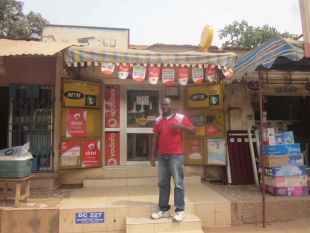
Edward and his shop. Photo credit: Sharon Benzoni
“Anyone who is schooled in the distribution of products,” says Samuel Addo of MTN, “will understand that in this market…you do not have an organized supply chain. This market is very clustered, made up of tiny, small, small businessmen. And you need to work with almost all of them if you’re going to have a successful product.”
In other words, the telco companies came to Ghana and saw informality as the solution to the challenge of getting their products into the hands of eager consumers. According to Addo, the informal sector has a number of advantages: it often concentrates in high-traffic areas, it accommodates consumers’ increasingly “grab-and-go” shopping habits, and it penetrates every part of the city. Though they have authorized distributors – one for each region of Ghana – with carefully managed franchises, most final sales of pre-paid top-up cards are ultimately made by informal sellers on the streets or at roadside kiosks.
The growth of the industry was largely spurred by the government’s establishment of the independent National Communications Authority and a range of liberalization policies designed to foster efficiency and competition. Business opportunities – or at least opportunities to earn a little income — have followed the explosion of the industry from a single government entity to six private companies. Though they offer very few formal employment opportunities, especially for those who have little education, by Addo’s rough estimate, over 200,000 people in Greater Accra make some portion of their income through the informal sales of telco products.
As one of the largest, fastest-growing domestic industries in Ghana, even the telcos’ huge informal sales force looks sharp. Among the women selling sachets of water and plantain chips and the young men hawking DVDs, the vendors selling telco cards look downright professional in their branded hats and vests. A step up from the street hawkers are the tiny stands of telco kiosks, often with a table, signboard and branded umbrella. It’s possible to make a living off telco-card sales alone — a small retailer, in Edward’s estimation, might sell between 100 and 2,000 Ghana cedis (roughly $50-1000 USD) in top-up cards per day. At the 4-6 percent retail mark-up, that’s between $2 and $60 USD in profits.
Most of the retailers and dealers sell all the telco brands. “We’ve tried exclusivity,” says Tetteh Okasey, a staff member of Izone, MTN’s authorized distributor for Greater Accra. We’re driving through a part of Accra I’ve somehow never been to: Nii Boi Town, tucked between the green estates of Achimota and bustling, crowded Lapaz. “It’s the New York of Accra,” Okasey says. It’s an offhand comment; I can’t tell if he’s joking or not, but the streets are certainly bustling and tiny drinking spots abound.
Exclusivity didn’t work, Okasey says, because independent retailers and subdealers simply wouldn’t do it. Customers wanted to be able to buy any of the telco brands from the most convenient retailer. “Look at that man!” he says, pointing out the window at a young man grinning at us, wearing a dayglo-green mesh vest and waving an array of yellow and red cards in front of the window. “He’s wearing a Glo vest and gleefully selling MTN.”
Okasey and I stop by one of his franchises and speak briefly with the woman sitting there, then pick up a plastic bag filled of cash. “The risk is high in this business,” says Hyatt Achkar, also of Izone. Theft and armed robberies from their shops and distributors are their biggest problems. “The cards are as good as money,” Addo told me. This is an advantage as well as a liability: if a seller needs cash, unsold stock can be quickly unloaded at very close to face value, but this also makes carrying large stocks of top-up cards nearly as dangerous as carrying a large wad of cash.
Back to Edward’s storefront in Lapaz, where I am sitting with the incredibly tall Okasey, his long limbs folded up in the chair next to me. Edward is explaining, and laughing, about attempted robberies at his store. “At times they come through the ceiling. They even came with his gun before.” In his tiny cement shop, he has installed iron gates behind the glass and two sets of gates between the reception area and the back. A small flat-screen TV displays security-camera footage from four different angles. He shows us his panic button and mentions his gun. His employees carry pepper spray. One of Izone’s franchises had a robbery over the weekend, and Edward is advising Okasey. His point: In this business, even a small-time entrepreneur like himself has to invest in security.
Just as frankly, Edward explains his concerns about the future of informal businessmen. All the competition is reducing the profit margins of the middle men like him. The voice market is saturated, so the telco sector is diversifying. Increasing demand for data services is one direction. Mobile Money, a sort of informal financial services system, Edward fears, will decrease demand for top-up cards. He’s already noted a 30 percent decrease in card sales since the inception of Mobile Money. In five years, he projects, business in top-up cards will be too low to sustain the current system. And what will he do then? “Then, by the grace of God, He will show us what to do,” he says, before outlining his strategy for every eventuality. Worst-case scenario, he’ll get out of the business and find something else to do. “In Ghana,” he says, “there’s a lot of opportunities here.”



